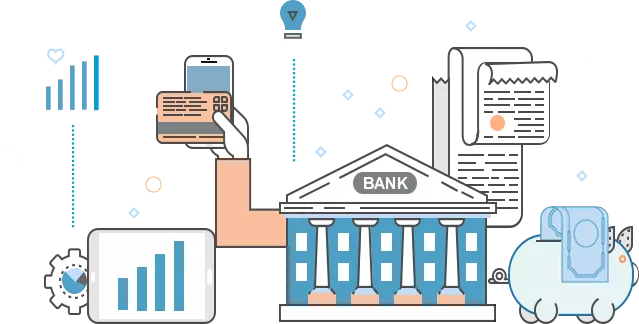When accounts become Non-Performing Assets (NPAs), it signifies a challenging situation for both lenders and borrowers. An NPA refers to a loan or credit account where the borrower has defaulted on payments for a specified period, typically 90 days or more. This non-payment of dues has several implications, both for the borrower and the lending institution.
Based on your current business strength & other monthly income from other sources like rental income etc, you can also opt for NPA Loan. NPA Loan is a loan facility from a new lender to take over NPA account liability from the previous banker to reschedule the repayment tenor and give some moratorium period to the borrower. In this way, your NPA account will be refinanced and you will get a tenor of around 4 to 5 years for repayment. Also, your NPA status will be removed after this new loan facility.
Let’s delve into what happens when accounts become NPAs:
Impact on Borrowers:
- Credit Score and Creditworthiness: When an account turns into an NPA, it adversely affects the borrower’s credit score. This makes it challenging for them to secure loans or credit in the future. Their creditworthiness is compromised, and other financial institutions may view them as higher-risk borrowers.
- Legal Consequences: If the default amount is significant, the lender may initiate legal proceedings to recover the outstanding dues. This can result in the borrower facing legal actions, such as asset seizure, wage garnishment, or even bankruptcy in severe cases.
- Difficulty in Obtaining Loans: Borrowers with NPAs often find it difficult to obtain fresh loans or credit facilities until they resolve the outstanding dues. The NPA status indicates to lenders that the borrower has a history of defaulting, making them reluctant to extend further credit.
Impact on Lenders:
- Financial Losses: When accounts become NPAs, lenders face the risk of significant financial losses. The outstanding principal, along with accrued interest, becomes doubtful, leading to reduced profitability for the lending institution.
- Provisioning Norms: Financial institutions are required to set aside provisions against NPAs as per regulatory guidelines. These provisions act as a safeguard against potential losses but can impact the profitability and overall financial health of the lending institution.
- Impaired Asset Quality: NPAs erode the quality of a lender’s asset portfolio, making it less attractive to investors and stakeholders. This can result in a decrease in the lender’s market value and hamper its ability to raise funds at favorable terms.
- Remedial Measures: Lenders employ various strategies to recover NPAs, including restructuring the loan, initiating recovery proceedings, or selling the loan to asset reconstruction companies. These measures, however, come with their own challenges and may not always result in full recovery of the outstanding dues.
Regulatory and Systemic Implications:
- Banking Sector Stability: A high level of NPAs in the banking system can indicate underlying issues, such as economic downturns or weak credit evaluation practices. This can impact the overall stability of the banking sector and require regulatory intervention to address systemic risks.
- Regulatory Guidelines: Regulatory authorities impose guidelines and norms on financial institutions regarding the classification, provisioning, and resolution of NPAs. Lenders are obligated to follow these guidelines and take necessary steps to address their NPA levels.
How to Survive NPA?
Surviving as an NPA account holder can be challenging, but there are steps you can take to navigate through this situation. Here are some suggestions to help you cope and potentially improve your circumstances:
Assess Your Financial Situation: Take a close look at your financial position and obligations. Understand your income, expenses, and other financial commitments. This will give you a clear picture of your ability to repay your debts and manage your finances effectively.
Communicate with the Lender: Establish open and honest communication with your lender. Inform them about your financial difficulties and demonstrate your willingness to resolve the situation. Discuss potential repayment plans or restructuring options that could make it more manageable for you to repay the outstanding dues.
Negotiate with the Lender: Engage in negotiations with your lender to find a mutually agreeable solution. This could involve discussing revised repayment terms, reduced interest rates, or extended timelines. Present a realistic repayment proposal based on your financial capacity, and be prepared to provide any supporting documentation required.
Seek Professional Advice: Consider seeking advice from financial counselors or professionals experienced in debt management. They can provide guidance on managing your finances, negotiating with lenders, and exploring potential debt relief options that could be available to you.
Explore Debt Restructuring or Settlement Options: Depending on your circumstances and the policies of your lender, you may be able to explore debt restructuring or settlement options. Debt restructuring involves modifying the terms of your loan, such as adjusting the repayment schedule or interest rates, to make it more affordable. Debt settlement involves negotiating with the lender to reach a reduced lump sum settlement amount that allows you to clear the debt.
Focus on Financial Discipline: Adopting a disciplined approach to managing your finances is crucial during this period. Create a budget, prioritize essential expenses, and minimize unnecessary spending. Aim to build an emergency fund to handle unforeseen expenses and establish a track record of responsible financial behavior.
Rebuilding Creditworthiness: Although it may take time, focus on rebuilding your creditworthiness. Once you have repaid the outstanding dues or reached a settlement, make consistent efforts to meet your financial obligations on time. Gradually, this responsible behavior will help improve your credit score and demonstrate to future lenders that you are a reliable borrower.
Remember, each situation is unique, and the options available to you may vary depending on factors such as the lender’s policies and the specific circumstances surrounding your NPA account. It’s advisable to consult with professionals and explore all available avenues to find the best approach for your situation.







